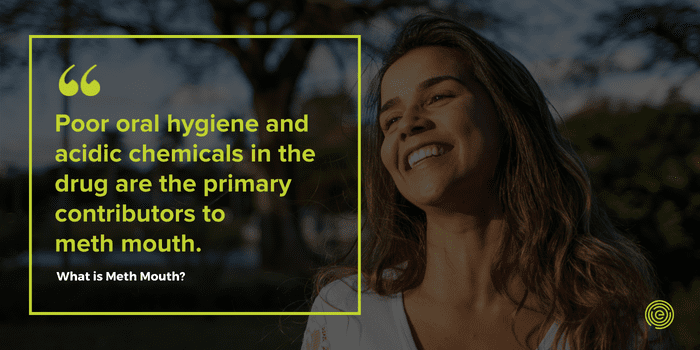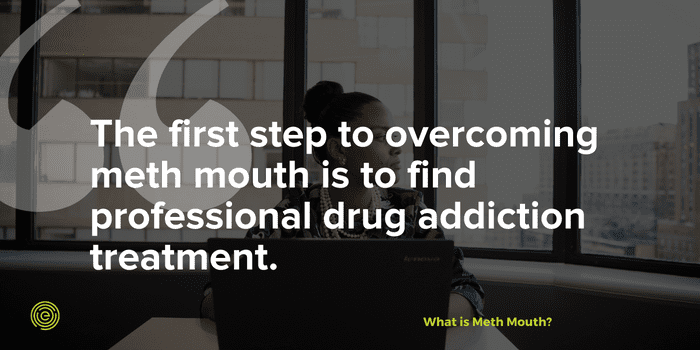Methamphetamine is a highly addictive drug that leads to severe health issues such as permanent brain damage and stroke. According to a 2015 study organized by the National Institute on Drug Abuse, meth causes devastating dental health problems to the user. Addiction to the drug leads to physical changes and acidic tooth decay. Users experience dental infections, causing bad breath. The teeth of individuals addicted to meth have characteristics such as falling apart, crumbling, rotting, staining, and blackening.
Snorting Meth leads to physiological and psychological changes resulting in poor oral hygiene and dry mouth. Studies suggest that the effects of crystal meth increase based on more abuse. Older cigarette smokers and women addicted to meth are more likely to suffer gum disease and adverse tooth decay. In most cases, dentists cannot salvage such teeth, and the best option is to get them removed. This guide explores meth mouth, including what it is, its effects, how to prevent it, and more.
What is Meth Mouth?
Meth mouth is a consequence of persistent Methamphetamine use. It leads to painful inflammation of the oral tissue and tooth decay.
Meth addicts experience reduced saliva in the mouth. This promotes mouth sores from meth, oral tissue damage, meth teeth, and bacterial growth. Such issues worsen as meth addictiveness leads to compulsive behavior such as lack of appropriate oral hygiene, recurrent tooth grinding, and increased sugary food consumption.
Methamphetamine is also called crystal, glass, ice pills, or speed. Meth addicts may take the drug as a pill, injection, snort, or smoke. Consuming the drug causes the brain to experience an intense pleasure lasting approximately 12 hours. This can cause persistent poor dental hygiene. Meth addictiveness makes users crave sugary, carbonated, and high-calorie beverages. They are likely to clench or grind their teeth, causing further damage.
Smoking is the most dangerous method of consuming the drug, as it offers quick access to the bloodstream and brain. While individuals use meth to experience euphoria, a sense of well-being, energy, and wakefulness, the effects are devastating. Addicts suffer negative social, medical, and psychological consequences.
Unfortunately, the recreational use of the drug is widespread. The annual meth abuse cost in the United States is over $30 billion. Research shows that approximately 2.6 million individuals in the country consume Methamphetamine, and the trend continues to increase.
Signs of Meth Addiction
Like any other drug abuse, addicts may not realize the severe symptoms until they reach the addiction stage. Meth addictiveness is so high that regular use can cause someone to become an addict.
The early signs of meth mouth kick in when the user becomes highly dependent on the drug. Physical signs associated with meth abuse include:
- Rotten teeth
- Meth mouth smell
- Intense scratching
- Increased body temperature
- Susceptibility to infectious disease/lowered immunity
- Stroke
- Liver damage
- Convulsions
- Reduced facial skin quality
- Increased libido
- Facial sores or acne
- A frail, thinning body
Increased libido is a sign of meth abuse that can lead to sexually transmitted diseases. The illicit drug causes increased adrenaline levels and sexual arousal, offering the user sexual interaction stamina. Meth is associated with lower inhibitions, and drug users are likely to engage in unsafe sexual relations.
Apart from the physical signs, meth abusers face various psychological symptoms. While users experience increased euphoria at first, they face long-term psychological consequences.
Some users may experience psychosis characterized by irritability, paranoia, visual/auditory hallucinations, and delusions. People with meth-induced psychosis may perceive things as bugs crawling on their bodies. This can cause them to scratch their skin intensely, leading to rashes and skin abrasions.
Like most highly addictive illicit drugs, methamphetamine abuse transforms an individual’s behavior in various ways. Users reach a phase where the drug becomes a priority and spend much time seeking it.
While individuals may hide their erratic behaviors, in the beginning, they reach a point when they no longer care about how others think of them. When this occurs, the meth addict’s behavioral changes soon cause them to face relationship issues, drop out of school and stop working. At this stage, meth use becomes more important than anything else.
Causes of Meth Mouth

What causes meth mouth? Methamphetamine abuse leads to meth mouth in multiple ways. According to research, poor oral hygiene and acidic chemicals in the drug are the primary contributors to meth mouth. A combination of factors causes this condition.
These include:
Poor Oral Hygiene
Meth users experience high for long hours, which impacts their hygiene habits. They most likely ignore essential activities, including dentist appointments, flossing, and brushing teeth.
Such behaviors lead to a build-up of a sticky bacteria film, a plaque in the addict’s teeth. If left unattended, it transforms into tartar, a hard substance on the teeth that requires a dental professional to remove. Tartar and plaque enhance the likelihood of tooth teeth loss, gum disease, and tooth decay.
Poor Nutrition
Typically, meth addicts crave sugary and high-calorie foods. Sugar primarily contributes to tooth decay by attracting bacteria to the teeth, accumulating tartar and plaque. Also, Meth decreases appetite, which means a user will likely miss out on essential nutrients that assist in dental healing.
Dry Mouth
Meth addicts suffer side effects such as xerostomia and dry mouth. This is because Methamphetamine leads to the production of the neurotransmitters serotonin, norepinephrine, and dopamine.
It decreases saliva release since the sympathetic nervous system is activated into “fight or flight.” Saliva washes away food debris and bacteria protecting the teeth. Without it, dental health issues are likely to occur.
Teeth Grinding
Meth addicts develop a behavior called bruxism or teeth grinding. Bruxism causes teeth to break, chip, or fall out over time.
Harmful Ingredients
Methamphetamine is acidic, which leads to the destruction of a tooth’s enamel, causing cavities. The drug can contain harsh chemicals, such as antifreeze, battery acid, and drain cleaner. These are harmful substances and can damage the mouth and teeth.
How to Prevent Meth Mouth
Many meth addicts want to know how to avoid meth mouth. Unfortunately, treatment is a complicated process, and it’s best to seek drug addiction treatment before the situation worsens. Failure to find treatment will cause damage that needs an extensive and expensive dental makeover. The best way is to stop using the drug completely.
Meth mouth prevention involves several options, including:
Get Treatment

The first step to overcoming meth mouth is to find professional drug addiction treatment. The recovery journey is challenging, but it helps reverse the severe impacts of methamphetamine abuse.
Seeking help from a drug detox center is an excellent option for meth addicts. A qualified drug addiction recovery facility offers comprehensive rehabilitation services, ensuring patients overcome their addiction comfortably.
Follow Recommended Dental Hygiene Program
Adhering to the recommended dental hygiene is another way to prevent meth mouth as it supports appropriate oral health. It’s essential to floss, brush your teeth twice daily, and visit a dental professional for routine teeth cleanings.
Stay Hydrated
Hydration is vital for proper oral health as it keeps the mouth clean. It removes acids from drinks, food, and plaque that make the enamel vulnerable. Drinking enough water ensures the mouth is hydrated and clean. Experts recommend drinking eight glasses of water each day.
Seek a Retainer from a Dentist
Teeth clenching and grinding are common issues with methamphetamine users. A qualified dentist helps combat this problem by designing a retainer to prevent clenching and grinding of teeth while you sleep.
Treatment of Meth Addiction
Understanding how to treat meth mouth is critical for improving the patient’s dental health. However, the first step toward long-term recovery is to stop meth addictiveness. Improving your oral health while using this drug won’t yield better results.
Once you overcome methamphetamine addiction, a dental expert recommends appropriate techniques to repair your smile. The professional addresses meth mouth issues using different techniques. Veneers are an excellent option for an individual with stained teeth, while prosthetic devices like implants or dentures replace missing teeth.
A patient with cavities due to methamphetamine addiction may get a filling and a mouthguard to prevent grinding during sleep. Professionals use preventive measures, such as topical fluorides, for long-term teeth protection.
Apart from getting professional dental treatment, a skilled addiction recovery facility helps you to overcome methamphetamine abuse, allowing you to get back on track with your life. They use multiple holistic and evidence-based treatment techniques to assist patients in recovery. These include:
- Biosound therapy
- Art therapy
- Dialectical behavior therapy (DBT)
- Cognitive behavior therapy (DBT)
- Yoga therapy
Accepting the need for drug addiction treatment is essential for meth addiction recovery. The drug is highly addictive, and it’s challenging for an individual to overcome it without the help of professionals. Drug addiction facilities understand how this problem ruins an individual’s life and evaluate a patient’s situation to recommend a personalized treatment regimen.
Mental Health and Addiction
Research by the National Alliance on Mental Illness suggests that one in five American adults have mental health issues yearly. Such problems increase the likelihood of substance abuse by 3.8%. Substance use disorder (SUD) is a complicated condition, and its impacts on the user are devastating.
Experts link drug addiction to mental health disorders like anxiety and depression. Abuse of addictive substances like Methamphetamine and marijuana can lead to long-term psychotic reactions. Alcohol worsens the symptoms of anxiety and depression.
According to scientific research, most people use drugs and alcohol to combat the symptoms of undiagnosed mental disorders. They want to change their mood temporarily or cope with adverse emotions. Individuals should know that self-medication doesn’t help overcome mental health issues and lead to long-term consequences.
Drug abuse enhances the risk associated with mental disorders. Knowing whether a patient’s mental health problem is directly related to their addiction is challenging. This is because mental health issues occur due to a complicated interplay of the environment, genetics, and other factors.
The best way to understand the root cause of an individual’s addiction is to seek professional help from a qualified recovery facility and access appropriate recovery tools and resources. Experts examine a patient’s situation to provide individualized mental health services. Whether addiction counseling or therapies, professionals provide holistic recovery options.
Seek Professional Help
Meth addiction is a disease that ruins an individual’s life, and it’s best to seek professional treatment immediately.
Our lines are open 24/7 to get you the help you need. Give us a call at one of the numbers listed below to learn more:
EHN Canada has locations across Canada that specialize in addiction and mental health treatment. If and when you’re ready, please reach out to begin your recovery journey.
EHN Bellwood Toronto
Toronto, ON
1-866-927-1585
EHN Edgewood Nanaimo
Vancouver Island, BC
1-866-841-7395
EHN Bellwood Nova Scotia
Lawrencetown, NS
1-866-955-5541
EHN Edgewood Rockies
Forte Steele, BC
1-866-320-7397
EHN Guardians Gateway
Peterborough, Ontario
1-866-938-6138
EHN Nouveau Depart Montreal
Montreal, Quebec
1-888-488-2611
Outpatient Services (Multiple locations): 1-866-963-1483




